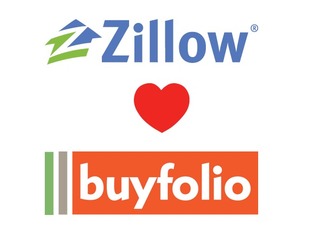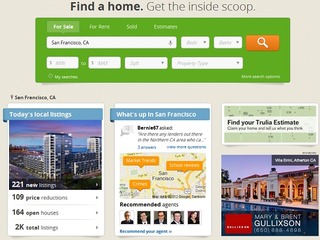Thirty Madison and Talkspace join forces to expand mental health access for women
Talkspace will be the therapy partner for femtech brand Nurx and migraine treatment platform Cove
Read more...
In what can only be described as a "mega-deal," two of the biggest online real estate marketplaces have decided to join forces to create one huge company.
Trulia is going to become part of Zillow, it was revealed in a press release on Monday. The deal is going to be worth $3.5 billion, in an all stock deal. The price is actually 25% more than the $56.35 of Trulia's closing stock price on July 25.
Under the acquisition, the Trulia brand will remain as a separate entity under the Zillow umbrella, with current Trulia CEO Pete Flint remaining in that same position, but reporting to Zillow CEO Spencer Rascoff. In addition, Flint will also become a member of the board of directors of the combined company.
In statements, both Flint and Rascoff pointed to the opportunities that combining their companies could point to in the future.
"Both companies have been enormously successful in creating compelling consumer brands and deep industry partnerships, but it's still early days in the world of real estate advertising on mobile and Web," said Rascoff. "This is a tremendous opportunity to combine our resources and achieve even more impressive innovation that will benefit consumers and the real estate industry."
"By working together, we will be able to create even more value for home buyers, sellers, and renters, as well as create a robust marketing platform that will help our industry partners connect with potential clients and grow their businesses even more efficiently," said Flint. "Our two companies share complementary employee cultures with innovative, consumer-first philosophies and a deep commitment to create the best products and services for our industry partners."
Both Zillow and Trulia are public companies, with Zillow's IPO taking place in 2010, and Trulia going public in 2012. Once the deal is approved, Trulia shareholders will own around a third of the combined company, while Zillow's shareholders will own the other two-thirds.
Now, given the size of these two companies, you're probably already thinking the word that would strike the most fear into the hearts of both of them: monopoly.
Zillow and Trulia are no doubt going to have to go through multiple regulatory channels for the deal to be approved, and they are both already attempting to get out ahead of it by declaring that "the two brands have limited consumer overlap."
"Approximately half of Trulia.com's monthly visitors do not visit Zillow.com, and approximately two-thirds of Zillow.com's monthly visitors across all devices do not use Trulia.com," they said.
"Maintaining the two distinct consumer brands will allow the combined company to continue to offer differentiated products and user experiences, attract more users and maximize the distribution of free content across multiple platforms, apps and channels."
Trulia, which provides tools and information for homebuyers, was founded in 2006. The company raised over $33 million in capital, including a $10 million Series C in 2007, led by Sequoia Capital, as well as previous investors Accel Partners and Fayez Sarofim & Co., and a $15 million Series D in 2008, from Sequoia Capital and Accel Partners.
In June, Trulia reported a record 54 million monthly unique users across its sites and mobile apps.
Zillow, founded in 2005, is an online real estate marketplace for finding and sharing information about homes, real estate, and mortgages. The company raised over $90 million before going public, from investors that included Technology Crossover Ventures, Benchmark, Legg Mason and PAR Capital Management.
In June, Zillow reported a record 83 million unique users across mobile and Web.
While shares of Zillow rose a slight 0.92% on Monday during regular trading, to $160.32 a share, Trulia's shares soared 15.42% to $65.04 a share.
(Image source: leppert.com)
Talkspace will be the therapy partner for femtech brand Nurx and migraine treatment platform Cove
Read more...Midi is currently on track to serve about 100,000 patients this year, up from about 30,000 in 2023
Read more...Wheel clinicians will be able to prescribe Owlet's BabySat, which monitors oxygen and heart rate
Read more...





